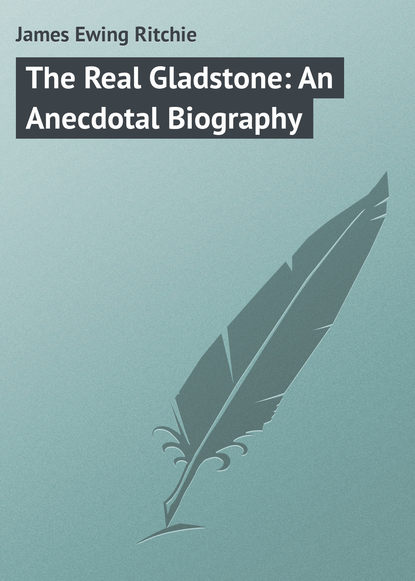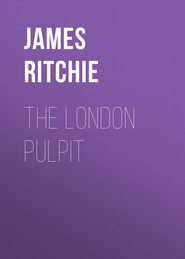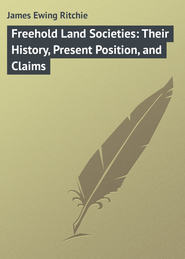По всем вопросам обращайтесь на: info@litportal.ru
(©) 2003-2024.
✖
The Real Gladstone: An Anecdotal Biography
Настройки чтения
Размер шрифта
Высота строк
Поля
‘Mr. Gladstone is an appreciated man, but he is not understood. Why not? The first duty of a pretty woman, it has been said, is to let everyone know that she is pretty. Extending that kind of code to the other sex, it is surely the first duty of an intellectual man to be intelligible. In this age there is more of the suspicion that Mr. Gladstone is Talleyrandizing, and using his copious vocabulary for the concealment of thought… He sees so much to say on all sides that he never clearly defines on which side lies the preponderating reasoning. He sums up controversies, rather than ranges himself in them. Debate is with him pure debate – a division appears, in his apprehension, rather to disfigure the proceedings… If Premier himself, he could ally himself on one hand with Mr. Milner Gibson, and on the other with Mr. Spencer Walpole. He is the juste milieu of the day, and, biding his time, he offers to his contingent supporters “chameleon’s diet – eating the air promise-crammed.’” – ‘Political Portraits,’ by E. M. Whittey, published in 1851, p. 226.
Mr. Hill, in his ‘Political Portraits,’ writes: ‘If Mr. Gladstone has to make up his mind while he is on his legs whether he will or will not answer a delicate question, he will express himself somewhat after this fashion: “The honourable gentleman, in the exercise of that discretion which I should be the last to deny to any member of this House, least of all to one so justly entitled to respect as my hon. friend, both on account of his high personal character and his long Parliamentary experience, has asked me whether the Government intend to bring in a Bill for the establishment of secular education in Ireland. Now, the discretion which I freely concede to the hon. gentleman in regard to the proposal of this question, I must, as a member of the Government, reserve to myself in considering whether or how I shall answer the question. I have to consider it not only in itself, but in regard to the time at which it is put, and the circumstances which surround the topic.” Mr. Gladstone then, perhaps, will say, what Lord Palmerston and Lord Russell would have said in a single sentence, that he must decline to answer it.’
Count Beust said: ‘Independently of the demerits and dangers of Mr. Gladstone’s Home Rule scheme, he has, to my mind, little or no excuse for introducing it, and the parallel he draws between it and the dual system I inaugurated is utterly fallacious. Agrarian agitation is the plea which he uses for giving the Irish people a separate Parliament. I believe that the agrarian system in Ireland has for centuries been a bad one, and the land legislation of 1881 – whatever people may think of it from a moral point of view – will unquestionably bring about good results. But how these results are to be beneficially increased by giving Ireland a separate Parliament, and handing over its government to the avowed enemies of England, I cannot see, for one of its first acts would be to pass laws – virtually decrees of expulsion – against the landlords, to banish capital from the land, and materially to aggravate the general condition of the peasantry. As an old statesman, I should consider that the establishment of an Irish Parliament, raising, as it unquestionably would, aspirations on the part of the people to free themselves from the English yoke, and increasing the power of political agitators, is fraught with the gravest danger to England. I cannot understand Mr. Gladstone quoting Austria-Hungary as an example, for, independently of the great dissimilarity between the two systems, Mr. Gladstone forgets the condition of Austria when the Hungarian Parliament was established. Austria had been beaten after a short but most disastrous war; Prussia had forbidden her any further interference in German affairs; the country was almost in a state of latent revolution; and an outbreak in Hungary, promoted by foreign agents and foreign gold, with Klapka doing Count Bismarck’s bidding, was in the highest degree probable, and would, had it occurred, have led to almost overwhelming disaster. Knowing this, I felt bound to advise the Emperor to accede to the views of the Déak party, securing the solidarity of the empire by the guarantees afforded through the systems of delegations and joint budget. Mr. Gladstone cannot urge upon your House of Commons the same reasons for granting Home Rule to Ireland. England has not been, and I trust never will be, beaten as Austria had been beaten. No foreign foe has been dictating terms at the gates of London. No revolution is latent, and, a point also worthy of consideration, the population of Ireland is only about five millions, including those Protestants who are against the Home Rule scheme, as compared with what I should think was the wish of the great majority of the thirty millions composing the population of Great Britain; whereas the area of Hungary is greater than that of Austria proper, and its population is nearly one-half of the total population of the empire.’
Well might Count Beust ask: ‘How can Mr. Gladstone use my dualistic system as a precedent for his scheme of Home Rule?’
Mr. Joseph Cowen said: ‘The super-subtlety of his intellect, his faculty for hair-splitting, and his love of party warfare, create distrust, and generate that strong sense of resentment which exists towards him amongst a numerous section of the community. If he were not so subtle he would be more successful. A plain straight man like Lord Hartington, or Lord John Russell, or Sir Stafford Northcote, impresses the average Englishman more favourably than a curiously acute one like the Prime Minister. The popular impression – that he is an austere purist, and would not resort to any of the tricks or wriggles that characterize ordinary party leaders – is altogether a mistake. Those who are brought in contact with the Legislature know that he can resort to any of the devices of partizanship as readily as men who are popularly accounted his inferiors. It is this many-sidedness that leads to the different estimates that are formed of him. He cannot but have felt very keenly the death of Gordon, and the massacre that ensued on the fall of Khartoum; yet I believe it is true that he went to the Criterion that night to see a very second-rate comedy. Ordinary persons having the responsibility that he had would not have been able to attend a theatre at such a time. The other day he laboured to impress the House of Commons with the extreme gravity of the position of affairs with Russia, and shortly after he went to see Miss Anderson play in “Pygmalion and Galatea.” These sudden changes from seriousness to seeming frivolity foster that sense of distrust which a large number of sober Englishmen feel towards him. They cannot understand how a man engaged in such grave and weighty transactions can feel them very acutely when he can so easily throw them on one side and ignore the responsibilities they entail.’
‘What a wonderful fellow Gladstone is, after all!’ said Mr. Disraeli one day to McCullagh Torrens. ‘He had a dreadful passage, I hear, coming back from Ireland, and the moment he got on shore he began to make a speech to the Welshmen, telling them that they were all right, and to keep so.’
‘What an ardent creature!’ he exclaimed as Mr. Gladstone rushed past them to vote on another occasion when a division had been called for.
Under the date of June 8, 1885, Sir Stafford Northcote writes: ‘The great debate came off to-night… The result, a majority of twelve against Government, took the House greatly by surprise, though we ourselves had reckoned on a victory by three or four votes. About forty of the Parnellites went with us. The excitement on the declaration of the numbers was very great, and displayed itself rather indecorously. Randolph Churchill jumped upon his seat and stood waving his pocket-handkerchief and shouting; Walter left the House with Algernon West, and said something about this being a curious end of Gladstone’s career. West said: “Oh, this won’t be the end now; you will see him come out more energetic than ever.”’ Sir Stafford Northcote, it may be stated, seems at times to have been a good deal bothered by Mr. Gladstone. ‘The most incredulous man I ever met!’ he writes in his diary; ‘keeps on shaking his head whenever I refer to him.’ Again he writes: ‘Gladstone had been dining out to meet the authoress of “Sister Dora” – Miss Lonsdale – who was very much alarmed by the rapidity and variety of his questions.’ Again we find him complaining of Gladstone’s habit of speaking late into the dinner-hour, so that his opponent must either speak to empty benches or forego the advantage of replying on the instant. After this, we must admit Mr. Gladstone’s description of himself on one occasion as an ‘old Parliamentary hand.’
‘Mr. Gladstone Close at Hand’ is the title of Dr. Parker’s article of gossip about Mr. Gladstone in the New Review. Once during his last Premiership Dr. Parker had the honour of breakfasting with Mr. Gladstone in Downing Street. After the meal Mr. Gladstone took down a book and read aloud an account of the circumstances under which Ireland was united to Great Britain. The account was so pathetic that the reader broke down and sobbed like a child. The ex-Premier permitted himself to be interviewed by means of a written catechism Dr. Parker sent him, and the answers are given in the article. Perhaps the way in which some of the questions are ingeniously not answered is as instructive as the direct replies to others. Asked whether, in his opinion, the Church of England had a firmer hold upon the people than ever it had, he said the Church suffered much from the general decline of what is called the prestige of churches, but had gained much from the transformation of the clergy. He does not believe in the interchange of pulpits. ‘With all respect for those clergymen who are willing to preach in Nonconformist pulpits, I must say,’ he replied, ‘they do not seem to form a proper conception of their own Church.’
Dr. Parker, not content with prose, broke out on one occasion into song, as follows:
‘An old Parliamentary Hand,
Bearing an axe and raising a shield,
Suspended the play with ominous words,
“Mine is the Bill that holds the field.”’
Lord Hatherley wrote in 1855: ‘There is but one man of genius in the House, I think – Gladstone.’
Professor Tyndall wrote in a letter to the Times: ‘Nature, which has so richly endowed him in many ways, has denied him the faculty of discerning the defeat which, even in the springtide of power and in the flush of victory, he has over and over again gratuitously wooed. In fact, he thinks too highly of himself and too meanly of his followers. Like Napoleon’s generals, they are to him mere mud, to be shaped and moulded according to his imperial will. The dissatisfaction arising from his conduct is not a thing of yesterday. God, as Mahomed says, has made men to be men – not foxes and wolves; and the love of truth and abhorrence of untruth inherent in the healthy British character have gradually opened the eyes of Mr. Gladstone’s most able and most independent supporters to his misdeeds. His errors of judgment, his political dishonesty, his impulsiveness and passion, so often invoked for purposes both ungenerous and unwise, his tampering for party ends with the sustaining bulwarks of the State, his cruel indifference to the fate of men far nobler than himself who had trustfully accepted from him tasks the faithful prosecution of which led them to a doom which he might have averted, but did not avert, the voice of many a brother’s blood crying from the ground, had already shaken the faith of honest Liberals in their idol, when his flagitious Irish policy put an end to their forbearance and caused them to fling abroad the banner of revolt. The cream of the Liberal party have been the seceders here; the men who above all others adorned the Liberal ranks have been the first to renounce the heresies of their recreant leader. A former worshipper of the ex-Prime Minister said to me some time ago: “Never in the history of England was there such a consensus of intellect arrayed against a statesman as that now arrayed against Mr. Gladstone. What a fall!”.. I see with concern letters from Liberal Unionists in the Times which seem to indicate that the writers only deem it necessary for Mr. Gladstone to declare his abandonment of Home Rule to make all right again with the Liberals. But who is to guarantee Mr. Gladstone’s good faith in this matter? He apostatized, for party purposes, when he became a Home Ruler, and he will apostatize again whenever it suits his ambition to do so. I should not be surprised if, some fine day, he took those simple Unionists at their word and made the required declaration. But could we be sure of him afterwards? For years, according to his own confession, he nourished in the dark corners of his mind this fungus of Home Rule, while to all his friends he seemed earnestly bent on extirpating it. A man of this stamp has no claim to the trust or credence of Liberal Unionists.’
Writing in 1879, Principal Tulloch says: ‘I bought the Observer on my way back, and read Gladstone’s philippic against the Government. What a man he is! What avenging and concentrated passion and power of hatred at the age of seventy! If he gets back to power, he will certainly play the devil with something.’
Dr. Talmage, who visited Mr. Gladstone at Hawarden a year or two since, sailed from Liverpool on the following day on his return to America. While in the Holy Land he secured a large stone from Calvary, which is intended to form the corner-stone of his proposed new church in Brooklyn. Dr. Talmage, who was interviewed after his visit to Hawarden, said he found Mr. Gladstone hale and hearty, and he ran up and down the hills like a boy. The ex-Premier was sanguine that his Home Rule scheme would succeed. Dr. Talmage asked if his faith in Christianity had wavered in his old age. Mr. Gladstone answered: ‘The longer I live, the stronger grows my faith in God, and my only hope for the world is that the human race will be brought more into contact with Divine revelation.’
Mr. Mozley writes in his ‘Reminiscences’: ‘As for Mr. Gladstone, I have for many years seldom thought of him without being reminded of the terrible lines in which Horace describes one of the attendants of that fickle goddess whom he believed to be the arbiter of civil strife. Often have I felt that I would rather grow cabbage, like Cincinnatus, than be the public executioner of usurpations, monopolies, and other abuses. But, after indulging in the sentiment, I have swelled the triumph of justice, peace, and public good. I have generally been so unfortunate in the use of my electoral privileges that I have come to think them hardly worth the fuss made about them; but the most unfortunate use I ever made of them – so I felt at the time – was when I went up to Oxford to vote for Mr. Gladstone, and he was actually elected. It was some excuse for this ridiculous inconsistency that I scarcely ever looked into Mr. Gladstone’s weekly organ – of course, he had not a weekly organ in any other sense than he had a tail to his coat – without seeing some very offensive and utterly untrue allusion to myself… But now, what is the singular good fortune or providential protection I began with? Simply this: I never in all my life once saw Mr. Gladstone, from the morning I met him in Hurdis Lushington’s room, three or four days after his arrival from Eton, till he was so good as to ask me to breakfast in June, 1882, and kindly suggest an alteration in my book. On the former occasion he had all the purple bloom and freshness of boyhood and the glow of generous emotion.’
Mr. Samuel Morley, M.P., wrote: ‘I regard Mr. Gladstone as the greatest, purest, and ablest statesman of the present age, and of all ages or of any age. How great the sympathy during his recent illness throughout the whole civilized world! With what? Not with Mr. Gladstone as M.P. for Midlothian; not with Gladstone as Premier or statesman; but simply with Gladstone as the embodiment of the highest and purest aspirations of that patriotism which desires the best of all good things for the greatest number of our own fellow-countrymen, and that the countrymen of all other countries may partake in these good things also. His life, his health, his genius, his power, and influence are of more consequence to the country than all or any of the most pressing questions now before Parliament.’
No one, as was to be expected, has been more variously or idiotically censured or blamed than Mr. Gladstone. Considerable ingenuity has been displayed by more than one pious clergyman to show that he is the beast of Revelation. In the opinion of one of them – the Rev. Canon Crosthwaite, of Kildare – beheading is too good for Mr. Gladstone. He has ‘bamboozled the House of Commons, and has persuaded it to rob God and put His patrimony into the Treasury of England. Essex lost his head for only talking to O’Neal across the river. What does not Mr. Gladstone deserve,’ asks the Canon, in the National Review, ‘for trafficking with Irish rebels and betraying to them all the rights of the British Crown? Yet this spoiler of the Church is allowed to read lessons.’ Another reverend, possibly a Dissenter, wrote to Mr. Gladstone to suggest that he would add to the services he has rendered religion by conducting a series of services in the Agricultural Hall. In reply, declining the suggestion, Mr. Gladstone wrote: ‘It would expose me, with justice, to that charge of ostentation which some think already attaches to me.’
Actually a reverend gentleman compiled, under the head of ‘Musical Evenings with the Great and Good,’ a service of song. The directions are to open with the hymn, ‘Hark, my soul! it is the Lord.’ A footnote informs us that ‘this hymn of Cowper’s has been translated by Mr. Gladstone into Italian.’ The direct bearing of these facts is not at once apparent, but possibly enlightenment may arrive during the ‘Prayer’ which is to follow. The first verse of the next hymn runs:
‘Sing we a song of praise to-day
For battles fought and victories won,
For strength vouchsafed upon our way,
And noble work our cause has done;
For joy that cometh after tears,
And harvests reaped for fifty years.’
Later on a kind of parenthetic observation runs, that ‘Oxford is an ancient seat of learning, and may be the fountain of intellectual light; but it has ever been the home of political darkness and the defender of exclusive privilege.’ As Mr. Gladstone’s earlier political career is very sweepingly condemned, and the evil influences of the University deplored, it is to be presumed that the half-century of harvest is a small stretch of the exuberant poetic licence that Mr. Thoseby permits himself occasionally. Personal encouragement to Mr. Gladstone, however, is not wanting, and he is told to
‘Hold on, my brother, hold on!
Hold on till the prize is won,
Hold on to the plough,
And weary not now,
For the work is well-nigh done.’
A subsequent song informs him positively that
‘The day shall appear,
When the might with the right
And the Truth shall be:
Come there what may to stand in the way,
That day the world shall see.’
And that there is to be
‘No surrender, no surrender
In the cause of truth and right.’
But perhaps the climax of Gladstonolatry is reached in the following passages:
‘In Mr. Gladstone’s work as legislator and administrator there is, from first to last, the same thoroughness and mastery. He never introduced a measure into the House in a crude and incomplete manner. He mastered every detail, and knew exactly the value and bearing of every suggestion and amendment offered, and whether he could admit it or not. He introduced no measures merely to curry favour, to strengthen his party, or catch the popular vote. He has always had regard to pressing needs, and has made it a matter of duty to press and pass the measures he introduced. And these measures have never been condemned except by “politicians in distress.” In his work as administrator he has not left the work to be done by subordinates. He has attended to his own duties, and toiled to understand every particular, and, in consequence, he has never had to vacillate, taking a position to-day from which he has had to withdraw to-morrow; saying one thing to-day and contradicting it the next.’
Remarkable as is the polished literary style of this citation, it is surpassed in the following fantastic rhapsody:
‘His beautiful residence at Hawarden Castle, in Cheshire, has much of the old baronial associations connected with it. It is delightfully situated in a finely-wooded park, where Mr. Gladstone’s well-known penchant for tree-felling, as a relaxation, finds ample scope. And where he also may gaze with joy on hill and dale, and
‘“Watch the wild birds soar and sing,
Or build their nest, or plume their wing.”’
And where, perchance, he may now and again sing to the birds. Might not those birds, those beautiful birds, represent Freedom! Political Freedom, the Sovereignty of Ideas, the Monarchy of Mind, the Republic of Intellect, Free Thought, Free Speech, Free Pews, Free Churches in a Free State, until there shall be no Party but God, and no Politics but Religion – the mighty Christ all in all.’
In 1870 Mr. Grant Duff, in the course of one of his addresses to his constituents, said that some years ago, when Mr. Gladstone’s Administration was in power, a clever Tory, who hated both Mr. Gladstone and his Administration, wrote the following acrostic:
‘G was the great man, mountain of mind;
L a logician, expert and refined;
A was an adept in rhetoric’s art,
D was the dark spot he had in his heart;
S was the sophistry led him astray;
T was the truth that he bartered away;
O was the cipher his conscience became;
N the new light that enlightened the same;
E was the evil one, shouting for joy,
“At it, and down with it, Gladstone, my boy.”
This acrostic was repeated in a drawing-room in the presence of a young lady of good Liberal principles, and the daughter of a well-known Member of Parliament, who, without leaving the room, went to a table and wrote this answer to it:
‘G is the genius that governs the nation;
L are the Lords, who require education;











